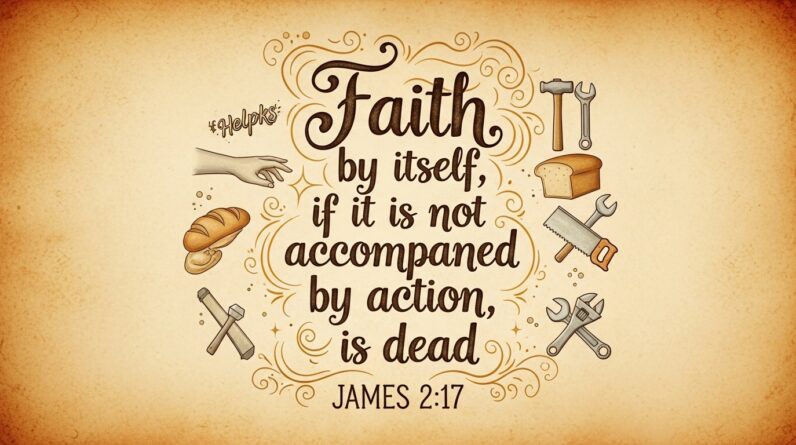Choosing Kindness: Applying Ephesians 4:32 In Everyday Interactions
You want your life to reflect Christ’s love in real, practical ways. That’s not an abstract ideal — it’s a daily choice. When Paul tells the church to “be kind and compassionate to one another, forgiving each other, just as in Christ God forgave you” in Ephesians 4:32, he’s not giving you a nice sentiment to hang on the wall; he’s giving you a lifestyle. You don’t have to be a theologian to put this into practice. You need a heart that is willing and small, and consistent steps. In this article, you’ll find the theology, the why, and the how — practical examples for work, home, and community life that will help you in applying Ephesians 4:32 today.
What Ephesians 4:32 Really Means
When you read Ephesians 4:32, notice three verbs: be kind, be compassionate, and forgive. Kindness and compassion are active virtues; they move you outward toward others. Forgiveness addresses the brokenness between people. Paul situates these commands in the context of the new life in Christ — a life shaped by grace and not by the law of payback. Understanding that God has forgiven you is the engine that powers your ability to be kind and forgiving. This isn’t about moral perfection; it’s about daily dependence on the Holy Spirit to reshape your heart.
Why Choosing Kindness Matters
You might think kindness is optional or merely pleasant. But kindness is strategic. It changes atmospheres, disarms hostility, and opens doors to conversation and healing. Scripture connects the fruit of the Spirit to kindness — see Galatians 5:22-23 — and shows that kindness is part of the character of people transformed by Christ. When you commit to applying Ephesians 4:32, you’re not only obeying God; you’re becoming a living witness of the gospel. People notice authenticity. A kind act speaks louder than a sermon.
The Biblical Pattern: Kindness Rooted in Christ
Kindness isn’t just about actions; it’s about identity. Paul writes in Colossians 3:12-14 that you are chosen, holy, and dearly loved, so clothe yourself with compassion, kindness, humility, gentleness, and patience. The pattern is clear: you receive identity in Christ, then you put on behaviors that match that identity. Forgiveness is the anchor — because God forgave you in Christ, you can extend forgiveness to others. When you practice applying Ephesians 4:32, you’re living out the new self God has given you.
Practical Principles for Everyday Kindness
You don’t need a gospel degree to practice kindness — you need principles. These principles help you think clearly when emotions run high.
Principle 1: Choose Empathy Over Judgment
When someone irritates you at work, at home, or in the grocery line, pause. Ask questions internally: What is that person’s story? How would Jesus respond? Empathy doesn’t excuse sin, but it helps you respond with perspective. Scripture teaches that love covers over a multitude of sins in 1 Peter 4:8. You might not feel like forgiving, but you can love.
Principle 2: Speak Gracefully, Not Harshly
A soft answer can defuse a heated moment. Proverbs tells us, “A gentle answer turns away wrath” — see Proverbs 15:1. When you’re practicing applying Ephesians 4:32, your words should build up rather than tear down. That means thinking before you speak and aiming for restoration rather than victory.
Principle 3: Make Forgiveness a Habit
Forgiveness is a discipline. It won’t always feel natural, especially when you’ve been deeply wronged. But the more you choose to forgive, the more your heart is shaped. Romans gives practical commands about returning good for evil and overcoming evil with good in Romans 12:9-21. Read those verses, pray them, and let them instruct your habits.
Applying Ephesians 4:32 at Work
Your workplace is a primary mission field. You spend a lot of hours there, and your interactions are opportunities to reflect Christ.
Small Acts of Kindness in the Office
You can model kindness with small, consistent acts: bring coffee for a coworker, thank people publicly, acknowledge effort, and offer to help when someone is overloaded. These gestures demonstrate that you value people above productivity metrics. When you are applying Ephesians 4:32 at work, you become a stabilizing presence who reduces tension and encourages trust.
Responding to Criticism with Grace
When you receive unfair criticism, your instinct might be to defend or retaliate. Instead, listen first, clarify, and respond with humility. If you must correct or defend, do it privately and compassionately. Remember Jesus’ model of confronting sin: direct, loving, and aimed at restoration. When you choose to be kind rather than combative, you protect not only relationships but your own witness.
Leading With Compassion
If you’re in a leadership role, kindness becomes structural. Create policies that honor employees’ dignity — flexible schedules, clear communication, fair evaluations. You can be firm without being harsh. A leader who practices applying Ephesians 4:32 earns respect because people follow not out of fear, but out of trust and affection.
Applying Ephesians 4:32 at Home
Home is where love is forged in everyday interactions. Your family watches how you react in small moments. Kindness at home is the seedbed for a Christlike character.
Kindness In Marriage
Marriage is where patience and forgiveness are tested daily. Choose to listen without jumping to conclusions. Say “I’m sorry” quickly when you’re wrong. Make a habit of praising and not nitpicking. When applying Ephesians 4:32 in marriage, you prioritize the relationship’s health over being right. That humility fosters intimacy and trust.
Parenting With Grace
Children learn about God’s love largely by observing your responses. When a child misbehaves, correct with love, not shame. Teach forgiveness by example — apologize when you snap, and show how to ask for and receive forgiveness. Your children will internalize kindness as a way of life because they saw it modeled consistently.
Caring for Aging Parents and Relatives
When you care for older family members, patience and compassion are essential. Their decline can be frustrating, but your presence can be a sacred ministry. Kindness may look like listening to stories, helping with daily tasks, and honoring their dignity. In such moments, you’re doing more than a duty — you’re reflecting Christ to those who raised you.

Applying Ephesians 4:32 in Community Life
Your neighborhood, church, and civic engagements are arenas where kindness has ripple effects beyond immediate circles.
Neighborly Kindness
Being a good neighbor means being present. Mow a lawn, bring a meal after an illness, check in on new families. Small, predictable acts create a network of care that strengthens the whole community. When you’re applying Ephesians 4:32 to neighborhood life, you contribute to a culture of mutual support and safety.
Serving Through the Church
Your church is a training ground for kindness. Volunteer with hospitality, prayer teams, children’s ministry, or outreach programs. Service disciplines your heart to notice needs and to act sacrificially. When you serve faithfully, you help form others in kindness and represent Christ’s love tangibly to outsiders.
Civic Kindness and Public Virtue
Kindness even plays out in public life: speak civilly about political differences, vote thoughtfully, and support policies that care for the vulnerable. You don’t have to agree with everyone, but you can refuse to dehumanize. Jesus calls you to love your enemies and do good to those who hate you in Luke 6:35, which translates into public kindness that seeks the common good.
Applying Ephesians 4:32 in Digital Spaces
The internet can amplify both cruelty and compassion. You’ll be tempted to be snappy behind a screen; resist that. Digital kindness is intentional.
Think Twice Before You Post
Before you comment on social media, ask: Will this build up? Is it true, necessary, and kind? The anonymity of screens can erode empathy, so slow down and assume generosity. When you are applying Ephesians 4:32 online, you model a different way of interacting — one that respects human dignity.
Use Your Platform for Good
If you have a platform, use it to amplify voices, share resources, and offer encouragement. Send private messages of support rather than public shaming. When conflict is necessary, choose private correction first, mirroring Jesus’ approach. Your online kindness can become a countercultural witness to the gospel.
Responding to Online Hurt
If someone attacks you online, you don’t have to retaliate. Instead, decide whether the best response is silence, a gracious correction, or a private dialogue. You can forgive even when you block or set boundaries; forgiveness doesn’t always mean removal of consequences. Applying Ephesians 4:32 in digital spheres preserves your peace and your testimony.
Dealing With Difficult People
Not everyone will welcome your kindness. Some will take advantage if you’re naive. Kindness is not the same as permissiveness. You need wisdom to know when to set boundaries, when to speak truth, and when to walk away.
Boundaries and Kindness
Boundaries protect your emotional and spiritual health. They’re not unkind; they’re loving mechanisms to prevent harm. If someone is abusive, limiting interaction is an act of stewardship. Kindness shows up in truth-telling and wise consequences, not in passivity.
When Forgiveness Is Hard
Forgiveness can feel impossible when wounds are deep. Start with small steps: pray for the person, rehearse forgiveness in prayer, then move toward restorative actions if possible. Forgiveness is more about freeing you from bitterness than excusing the wrong. The Bible calls you to forgive because God forgave you in Christ — see Ephesians 4:32. When you practice forgiving, you reclaim your peace.
Protecting the Vulnerable
Part of kindness is protecting those who can’t protect themselves. When you see exploitation or abuse, act. Speak up, get help, and walk alongside victims. Doing justice is a Christian discipline that flows from a kind heart.
Spiritual Disciplines That Build Kindness
Kindness isn’t built in a day. It’s a fruit that grows as you walk with God. Adopt spiritual rhythms that feed a kind heart.
Prayer and Dependence
Pray for a kinder heart. Ask God to soften your responses and to reveal when pride or fear fuels your reactions. Prayer reorients you from self-reliance to Spirit-reliance. Jesus modeled prayer before action; follow that pattern.
Scripture and Meditation
Meditate on passages that shape your heart for others. Read Colossians 3:12-14 and let those virtues sink in. When you renew your mind with God’s Word, your behaviors follow.
Community and Accountability
You grow kinder in community. Invite a friend to pray for you, ask for feedback on your reactions, and participate in groups that practice confession and restoration. Community is where the gospel’s work of transformation is tested and strengthened.
Practical Exercises to Develop Kindness
You’ll grow faster if you practice kindness intentionally. Try these daily exercises to make kindness a habit.
- Start each day by asking God for one person to serve. Aim to bless them tangibly.
- Keep a “kindness log” where you note small acts and how people responded. Reflection builds momentum.
- Practice active listening: in conversations, listen for five extra seconds before responding. This habit reduces interrupting and increases compassion.
These simple practices help when you are applying Ephesians 4:32 because they train your heart to notice needs and to move toward others with grace.
Stories: Real-World Examples
Stories help you see how kindness plays out in ordinary life. Consider a coworker who always shows up early to set up meeting rooms so others can be on time. That’s kindness without fanfare. Think of a parent who chooses to speak softly to a teenager who just made a bad choice rather than yelling. Or a neighbor who brings meals after surgery. These are not grand gestures; they are daily expressions of Christ’s love that change people’s lives.
A Workplace Story
Imagine you work with someone who sulks and criticizes. Instead of matching their tone, you invite them to coffee and ask about the pressure they are under. Over time they open up, and some of their behavior improves simply because they felt seen. When you practice applying Ephesians 4:32 in this way, you create relational space for healing.
A Family Story
A husband forgets an important date and hurts his wife’s feelings. Instead of defensiveness, he listens, apologizes, and plans a weekend to reconnect. That kind response rebuilds trust. These are the small moments where grace takes root and grows.
Overcoming Barriers to Kindness
You will face obstacles: busyness, resentment, fear of being used, and cultural norms that reward toughness over tenderness. Consciously work against these barriers.
Busyness and Priorities
If you’re constantly rushed, choose to simplify. Kindness often requires time. Reassess your calendar and protect margin for relationships. When you prioritize people, you model Kingdom values.
Resentment and Unforgiveness
Unforgiveness hardens your heart. Address resentment through confession, counseling, and prayer. Let the gospel heal your internal wounds so you can offer kindness freely.
Fear of Being Manipulated
Sometimes people will exploit kindness. Practice wise generosity: be kind and also discerning. Set boundaries and seek counsel when unsure. Kindness plus wisdom protects you and honors others.

The Long-Term Fruit of Choosing Kindness
When you make deliberate choices to be kind, you don’t just change one relationship — you shape your character. Over time, kindness becomes reflexive. Communities that practice kindness become healthier, marriages become stronger, and churches become more effective witnesses. Scripture promises that kindness is part of the fruit the Spirit grows in you — Galatians 5:22-23. When you are applying Ephesians 4:32 faithfully, you join a long line of believers whose lives draw others to Christ.
God’s Kindness as Your Model
All of this points back to Christ’s kindness to you. God’s mercy and forgiveness are the foundation for your kindness. Remember that Christ forgave, served, and laid down his life for you. As you mirror that grace, you become a living sermon. The Bible constantly calls you to kindness because God’s own character is kind — see how Romans and the Gospels portray Jesus’ compassion in many ways, and let that shape your response.
Final Encouragement: Start Small, Start Now
You might be tempted to wait for the “perfect” moment or the “right” heart. Don’t. Begin with one small act today: a kind word to a coworker, an apology to a family member, a call to a lonely neighbor. Love grows on the vine of obedience. Keep practicing, keep praying, and let Scripture train your heart. Remember Ephesians 4:32 and keep applying Ephesians 4:32 in the ordinary spaces of your life. You’ll be amazed at how God uses little faithful acts to change hearts and communities.
When you look back, you’ll see that the quiet investments — listening, forgiving, serving — produced lasting fruit. Paul’s call wasn’t just theological; it was practical. Make kindness your daily discipline and watch how it transforms your relationships and your world. Keep applying Ephesians 4:32 in your conversations, your decisions, and your rhythms of life, and you’ll live a life that points others to the love of Christ.
Explore More
For further reading and encouragement, check out these posts:
👉 7 Bible Verses About Faith in Hard Times
👉 Job’s Faith: What We Can Learn From His Trials
👉 How To Trust God When Everything Falls Apart
👉 Why God Allows Suffering – A Biblical Perspective
👉 Faith Over Fear: How To Stand Strong In Uncertain Seasons
👉 How To Encourage Someone Struggling With Their Faith
👉 5 Prayers for Strength When You’re Feeling Weak

📘 Jesus and the Woman Caught in Adultery – Grace and Mercy Over Judgement
A powerful retelling of John 8:1-11. This book brings to life the depth of forgiveness, mercy, and God’s unwavering love.
👉 Check it now on Amazon
As a ClickBank Affiliate, I earn from qualifying purchases.
Acknowledgment: All Bible verses referenced in this article were accessed via Bible Gateway (or Bible Hub).
“Want to explore more? Check out our latest post on Why Jesus? and discover the life-changing truth of the Gospel!”








